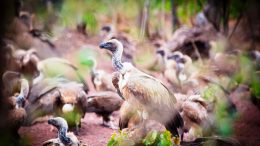A narrow road meanders through Zimbabwe’s Vumba Mountains, where sweet songs of various bird species fill the air on a sunny afternoon. The distant chatter of monkeys adds to this wildlife melody.
But one sound, once common, no longer echoes over the mountains: the calls of soaring vultures.
These majestic birds have disappeared from this part of Zimbabwe. Big game poachers despise vultures for circling over the carcasses of dead animals — a natural process that inadvertently “snitches” poachers’ illicit activities to game park rangers. Poachers have retaliated by lacing the bodies of their prey with deadly poison, which vultures consume, dramatically increasing the killers’ body counts.
That’s not the only threat these birds face. Habitat loss is a big issue. In some cases vultures are killed for their parts, which are used in traditional “medicine” in some cultures of Zimbabwe. And to a lesser extent, power lines have also killed vultures, who die from electrocution or after collisions with the structures.
The threats have all but wiped out the vultures, in this area known for its birds.
“Birding in the Vumba as well as the Burma Valley area [in Zimbabwe] is considered a shining jewel in the Eastern Highlands, and tourists travel far and wide for the very special birds found here. However, vultures are no longer a presence,” says Sue Fenwick, a trustee of the Friends of the Vumba, an organization working to protect wildlife in the area.
The group’s mission faces many challenges. In this part of Zimbabwe, illegal farming activities have decimated vast tracts of wildlife habitats.
Benhildah Antonio, who manages the Preventing Extinctions Program at Birdlife Zimbabwe, says the twin threats of farming and poisons intersect.
In addition to poachers’ poisons, Antonio says vultures are often poisoned unintentionally. This is prevalent in farming communities surrounding national parks, where lions prey on livestock.
“Farmers put poison on carcasses to target lions or any other predators but unintentionally end up poisoning vultures,” Antonio says. “The vultures will die in large numbers because of their feeding habits. One carcass can have 50 or more vultures feeding on it.”
A Loss That Echoes
Vultures’ disappearance from Zimbabwe and other African countries comes with an environmental cost.
“We call them the ‘clean-up crew,’” says Antonio. “When the vultures feed on dead carcasses, they help us with cleaning the environment; they help us with sanitation. That’s the main ecosystem service we get from vultures. They do this free service. They also reduce the spread of … rabies, anthrax, tuberculosis, and other diseases.”
When vultures eat a carcass, they can digest pathogens without getting sick. At the same time, vultures reduce the available food sources for feral dogs and other scavengers, thereby suppressing diseases like rabies.
Many Species, Similar Threats
According to Birdlife Zimbabwe, Africa is home to 11 vulture species, six of which can be found in Zimbabwe. All but one of the species in Zimbabwe are threatened or endangered.
The International Union of Conservation of Nature Red List, which assesses the conservation status of species around the world, classifies the white-backed vulture, white-headed vulture, and hooded vulture as critically endangered. The lappet-faced vulture and cape vulture are categorized as endangered and “vulnerable to extinction” respectively, while the palm-nut vulture is listed as “least concern” (although it was last assessed a decade ago).
Regardless of their conservation status, all vultures in Zimbabwe have special protection under the Zimbabwe Parks and Wildlife Act, making it illegal to kill a vulture, even in cases of accidental harm.
View this post on Instagram
The six species have specific habitat niches, but many of their ranges overlap in Zimbabwe. The lappet-faced vulture breeds in Lowveld semi-arid areas like Gonarezhou National Park, while the white-headed vulture breeds in Hwange National Park and Gonarezhou. Cape vultures rely on cliffs for breeding and roosting, particularly in the central parts of the country. The hooded vulture breeds in low-lying areas of Tsholotsho and Gokwe. Palm-nut vultures, though considered rare in Zimbabwe, are seen mostly in the country’s Eastern Highlands.
But no matter where they’re found, they face the same dangers — and vultures’ declines aren’t unique to Zimbabwe.
A Worldwide Threat
José Tavares, director of the Vulture Conservation Foundation, says the major threats to vultures in Africa and globally come from the ingestion of poison baits.
“These [poison baits] are mostly put to deal with human-wildlife conflict, although in Southern Africa sentinel poisoning has also been significant,” Tavares says, referring to the poisoning to prevent circling vultures from giving away poachers’ locations. “The illegal poisoning of wildlife is a non-discriminatory measure that has a profound impact.”
Zimbabwe presents a powerful illustration of the problem. According to the Zimbabwe Parks and Wildlife Management Authority (Zimparks) 2019-2022 Action Plan, the country experienced increased vulture poisoning incidents that are causing vulture populations to decline and harming other species. Mass poisoning events cited in the report include 191 vultures in Gonarezhou National Park in 2012, 40 at a farm in Fort Rixon in 2014, 22 in Sinamatella in 2015, 43 at Sentinel Ranch in 2016, 94 on the border of Gonarezhou National Park in 2017, 24 at Sengwa Wildlife Research Station in 2017, 28 in Main Camp in 2018, and 21 in Hwange National Park in 2019. There is no recent data from Zimparks covering the post-COVID period.
According to former Zimparks director Fulton Mangwanya, a single vulture provides over US$11,000 worth of ecosystem services.
“By halting the spread of disease, they are worth much more to society in saved health service costs, not to mention contributing significant revenue to the tourism sector as well,” Mangwanya wrote in the action plan.
This poses direct threats to humans. In India, for example, one study reveals that between 2000 and 2005, the loss of vultures caused around 100,000 additional human deaths annually, resulting in more than £53 billion per year in mortality damages, or the economic costs associated with premature deaths. These deaths, experts say, were due to the spread of disease and bacteria that vultures could have otherwise removed from the environment.
Has the decline in vultures caused similar problems in Zimbabwe?
Kerri Wolter, chief executive officer of VulPro, a South African nonprofit organization devoted to safeguarding Africa’s vulture species, says it’s impossible to link the recent outbreak of anthrax in Gonarezhou National Park to the massive poisoning deaths of 280 vultures in the park in the past few years. The anthrax outbreak last year killed more than 120 animals, including four elephants, 75 buffaloes, and 38 kudus. However, more studies are needed on the possible link between the declining vulture population in Zimbabwe and rising cases of anthrax in the country’s national parks.
But Wolter says the future of these birds is dire and the threat of vulture species’ extinctions is a very real possibility.
“If we cannot get a grip on poisonings, I fear we will continue to see losses and some species disappearing,” she says.
Saving Zimbabwe’s Vultures
With an understanding of these threats, local and international groups have mobilized several efforts in Zimbabwe that aim to save the country’s last vultures.
Birdlife Zimbabwe, for example, is working with communities to resolve human-wildlife conflict issues so they don’t end up causing vulture deaths as collateral damage.
“We have created vulture support groups in [Zimbabwe’s] Gwayi area, where community members do vulture monitoring and educate other community members about vulture conservation,” Antonio says. “We are also educating and building capacity for law-enforcement agents so that they are conscious about vulture conservation and crimes against vultures. We also work with traditional healers because of belief-based use of vultures in traditional medicines.”
And Tavares says the Vulture Conservation Foundation is fighting illegal poisoning through engaging with the competent authorities for the proper enforcement of the law and adequate investigation of illegal poisoning incidents to reduce impunity.
Wolter says their work impacts the whole Southern Africa region.
“We lead by example and have assisted, trained, and worked with Victoria Falls Wildlife Trust and Jabulani Safaris [in Zimbabwe] and continue to do so,” she says.
Other efforts, including one funded by tourism, help vultures by giving them what they need most: safe food. The Victoria Falls Safari Collection, operated by the Africa Albida Tourism hospitality group, runs the Vulture Culture Experience at Victoria Falls Safari Lodge, where the birds are provided with food, typically animal carcasses, to support their survival and well-being.
View this post on Instagram
“Our … conservation initiative has been highly successful in providing a safe food source for hundreds of vultures every day and reducing the risks of poisoning they face in the wild,” says Anald Musonza, head of sales and marketing at Victoria Falls Safari Collection.
Musonza says the program has also become a powerful educational platform, where thousands of visitors learn about the plight of these highly endangered raptors and turn into ambassadors for vulture conservation.
“Even when our hotels stood still during COVID, the Vulture Culture Experience never stopped — that’s how seriously we take conservation,” Musonza says.
He says they work with VulPro as well as the Victoria Falls Wildlife Trust on this project.
“While the activity is free of charge, guests may make donations towards vulture research, and $1 from selected dishes at our MaKuwa-Kuwa Restaurant is donated to vulture conservation programs,” he says.
Musonza says their biggest challenges have been in constantly raising awareness of the threats vultures face and the significant role they play in the ecosystem.
“The poisoning of these birds is also of great concern, which is why education plays a crucial role in this conservation initiative,” Musonza says.
Previously in The Revelator:
Newest Flock of Wild California Condors Faces an Old Threat: Lead Poisoning



